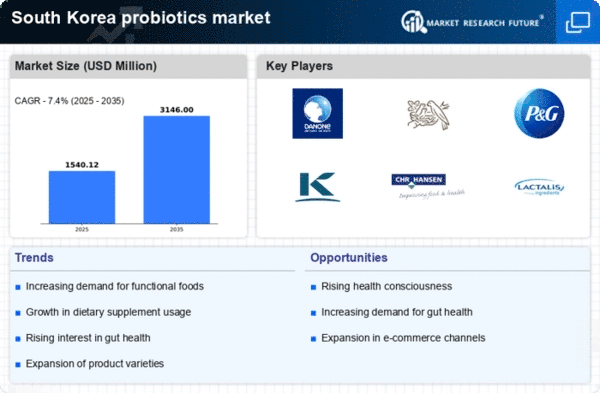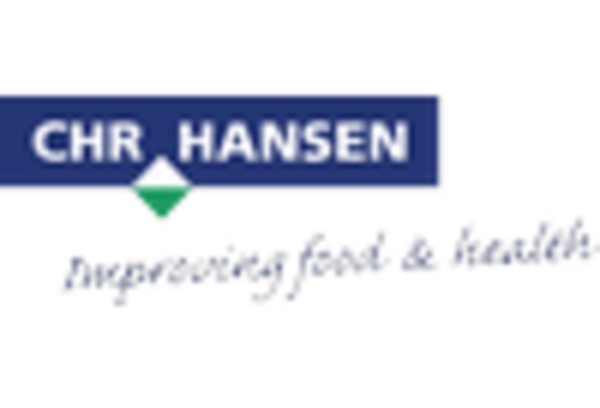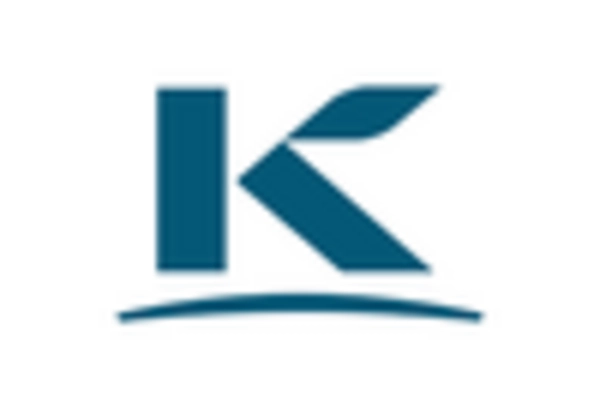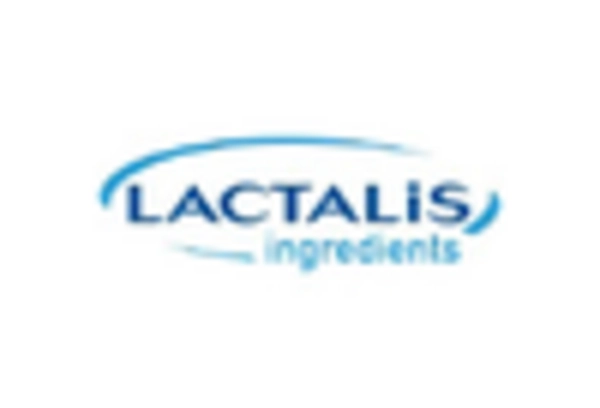Expansion of E-commerce Platforms
The probiotics market in South Korea is experiencing a transformation due to the expansion of e-commerce platforms. With the increasing penetration of the internet and mobile devices, consumers are turning to online shopping for health products, including probiotics. Recent statistics indicate that online sales of health supplements have surged by 30% in the past year alone. This shift towards e-commerce not only provides consumers with greater access to a diverse range of probiotic products but also allows for convenient purchasing options. As a result, the probiotics market is likely to benefit from this trend, as more consumers opt for online platforms to fulfill their health needs. The convenience and variety offered by e-commerce are expected to drive sales growth in the probiotics market, making it a vital channel for manufacturers.
Rising Popularity of Functional Foods
The probiotics market in South Korea is significantly influenced by the rising popularity of functional foods. Consumers are increasingly inclined towards foods that offer health benefits beyond basic nutrition. This trend is evident in the growing incorporation of probiotics into various food products, such as yogurt, beverages, and snacks. According to market data, the functional food sector in South Korea is expected to grow at a CAGR of 9% over the next five years, with probiotics playing a crucial role in this expansion. The integration of probiotics into everyday foods not only enhances their appeal but also aligns with the health-conscious mindset of South Korean consumers. Consequently, this trend is likely to drive the growth of the probiotics market, as more individuals seek convenient and tasty ways to incorporate probiotics into their diets.
Growing Interest in Personalized Nutrition
The probiotics market in South Korea is increasingly influenced by the growing interest in personalized nutrition. Consumers are becoming more aware of the unique health needs of their bodies, leading to a demand for tailored probiotic solutions. This trend is supported by advancements in technology, such as genetic testing and microbiome analysis, which enable individuals to identify specific probiotic strains that may benefit them. Market Research Future indicates that the personalized nutrition segment is expected to grow by 10% annually, with probiotics being a key component. As consumers seek customized health solutions, the probiotics market is likely to expand, with manufacturers focusing on developing products that cater to individual health profiles. This shift towards personalization may redefine the landscape of the probiotics market, fostering innovation and growth.
Increased Awareness of Mental Health Benefits
The probiotics market in South Korea is witnessing a shift towards recognizing the mental health benefits associated with probiotics. Emerging research suggests a strong connection between gut health and mental well-being, leading to increased consumer interest in products that support both. Approximately 60% of South Koreans are now aware of the potential mental health benefits of probiotics, which has prompted manufacturers to develop targeted products. This growing awareness is likely to expand the probiotics market, as consumers seek solutions that address both physical and mental health. The market is projected to grow by 7% annually, driven by this dual focus on health. As mental health continues to gain prominence in public discourse, the probiotics market may see further innovations aimed at enhancing cognitive function and emotional well-being.
Increasing Demand for Digestive Health Solutions
The probiotics market in South Korea experiences a notable surge in demand for products that promote digestive health. This trend is largely driven by a growing awareness among consumers regarding the importance of gut health. Research indicates that approximately 70% of South Koreans actively seek dietary supplements that enhance digestive function. As a result, manufacturers are increasingly focusing on developing innovative probiotic formulations that cater to this demand. The probiotics market is projected to reach a valuation of $500 million by 2026, reflecting a compound annual growth rate (CAGR) of 8% from 2021 to 2026. This increasing demand for digestive health solutions is likely to propel the growth of the probiotics market in South Korea, as consumers prioritize their well-being and seek effective products to support their digestive systems.
















